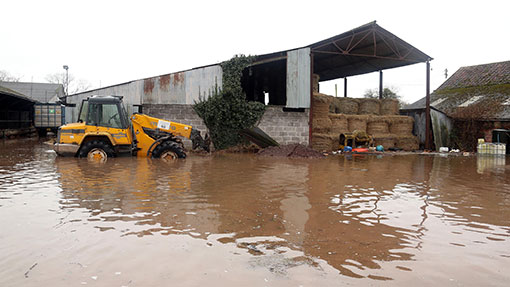Flood damage cost to farms rises to £60m

The floods and storms are already estimated to have done more than £60m worth of damage to farms.
As claims are made, some key points about farm insurance are emerging. For example, most standard farm insurance policies do not cover livestock losses on the farmer’s own and rented land unless an extension to cover fatal injury has been taken.
Likewise, most standard farm policies do not cover growing/standing crops or produce such as straw stored outdoors.
Claimants should gather evidence of losses using photographic and other records, said Graham Plaister, a livestock loss adjuster with Agrical.
See also: Video: Flooded farmer expects serious crop losses
Where stored crops have been lost, standard cover would also usually pay for the cost of clearing the spoilt produce under debris removal, he said.
“As you take measures it’s important to keep the insurer informed as you go along. If everything is done economically and sensibly there should not be any issues.”
Graham Plaister, Agrical
Farmers should notify insurers as soon as possible of claims and where repairs were necessary for business efficiency and continuation, they should be carried out, said Mr Plaister. “In these situations farmers need to get back up and running and reasonable repairs to allow that would not generally prejudice a claim,” he said.
“As you take measures it’s important to keep the insurer informed as you go along. If everything is done economically and sensibly there should not be any issues.”
The consequential losses arising from storm damage are often bigger than the initial loss itself and are only covered where the business has additional protection above the level provided by the standard.
This extra cover is often referred to as business interruption or income protection cover (also sometimes called revenue cover) and for example would pay for the cost of items such as hiring in temporary equipment or renting buildings to allow the business to resume as quickly as possible.
However, while many farmers had this type of cover, storm and flood were often not chosen by them as named perils under it, said Mike Ellis, chief operating officer of insurer Rural Insurance.
